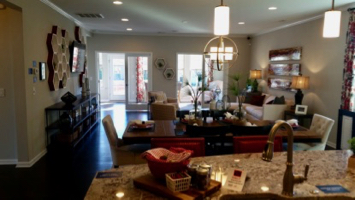Closing costs are typically fees associated with acquiring the property. They don’t generally effect the price of the house.
Down payment goes towards the purchase price and the remainder is the loan.
Buyers costs before closing paid to the seller
- Due Diligence Money
- This amount is negotiable. When you are battling multiple offer situations, upping this could be the advantage you need. However, this money is the sellers once they accept your offer. If there is anything about the house that could scare you away, don’t put down more than you are willing to lose if you walk away from the deal. This will be a credit from the seller when you close since they already have it and it needs to be accounted for. On short sale and foreclosures this is not needed. Builders generally don’t have this and they call it a builder deposit.
- Builder deposit ~500$-20% of purchase price.
- Money that you put down for a builder to work with you on a new home purchase. These are generally not refunded unless the loan is not approved. This will show up on the closing documents as a deposit from you towards the house.
- Earnest Money ~1-2% of the purchase price
- Earnest money is put down as good faith money that gets put into a company’s trust account and held until closing or refunded if you terminate the contract before the due diligence period. I normally go for around 1% of the sale price.
Costs paid for inspections to the companies directly.
- Home Inspection ~500$, based on the square footage of the house.
- Termite Inspection ~90$
- NC has termites everywhere. You can’t get away from them! New construction has a termite bond on the house. If you keep renewing you can get a deal to have the company maintain the termite protection.
- Keep untreated wood away from the house. If you have a wood burning fireplace, put your wood stack near the back of your property and bring smaller loads up/in as needed.
- Radon Inspection ~150$
- Radon is a naturally occurring radioactive gas. It works it’s way up through the earth. Testing typically involves having a machine that sits in the home for an extended period and measures the levels through the day. It can be mitigated if found to be above 4pCi/L inside. Click here for more info on Radon.
- Septic Inspection
- Well Inspection
- HVAC Inspection
- Pretty much any inspection
Closing costs for the loan. Paid to the lender.
- Appraisal ~400$
- Credit Report ~50$
- Flood Certificate ~30$
- Lender Title Insurance ~.0015% of purchase price
- Protects the lender should there be an issue in the title that was not uncovered during the title search.
- Loan Origination ~1% of purchase price
- Loan Down Payment
- This will be the money you are bringing to put down on the house. Typical amounts are anywhere between 3.5%-20%. There are some 0% down loan programs out there.
- Prepaid Interest
- Based on the day you close on the house until the first payment.
- Points – % of purchase price.
- These are optional buy down or credit back. Each “point” is based on a percent of the loaned amount. To quickly calculate the number. Take your purchase price (400,000) and multiply it by the percent of the point (0.4% would be 400000x.004) to get your price (1600) that would be paid by you or to you.
- Private Mortgage Insurance (PMI) ~100$/month
- Required on loans that do not meet the banks threshold for equity invested. Normally this is 20% down on the house and finance the other 80%.
- This protects the bank should the loan go into default.
Other closing costs
- Survey ~500$
- Recording Fees ~90$
- Courier Fees ~50$
- Owner Title Insurance ~.0012$ of purchase price.
- Property Taxes
- Prorated for the year with seller. May be credited to you or seller depending if they are already paid.
- HOA Dues
- prorated from the day you close on the house to
- HOA Transfer fee ~150$
- One time transfer. Amount differs based on the HOA.
- HOA Working Capital fee ~150$
- One time payment into the HOA maintenance.
- Home Owner Insurance
- 1 year paid up front.
- Contact your insurance company to get a quote. Some overages to ask about:
- Flood
- Electronics
- Guns
- Jewelry
- Wind damage
- Attorney ~700$
- Home Warranty ~550
Money put into escrow
- HOA Dues ~3 months
- Taxes ~3 months
- Home Owner Insurance ~3 months
- Private Mortgage Insurance (PMI) ~3 months
For a list of most costs in an table format, click this link:
Google Doc of Buyer Closing Costs
Thanks for visiting!
#4x4realtor #newconstructionspecialist #sell919

